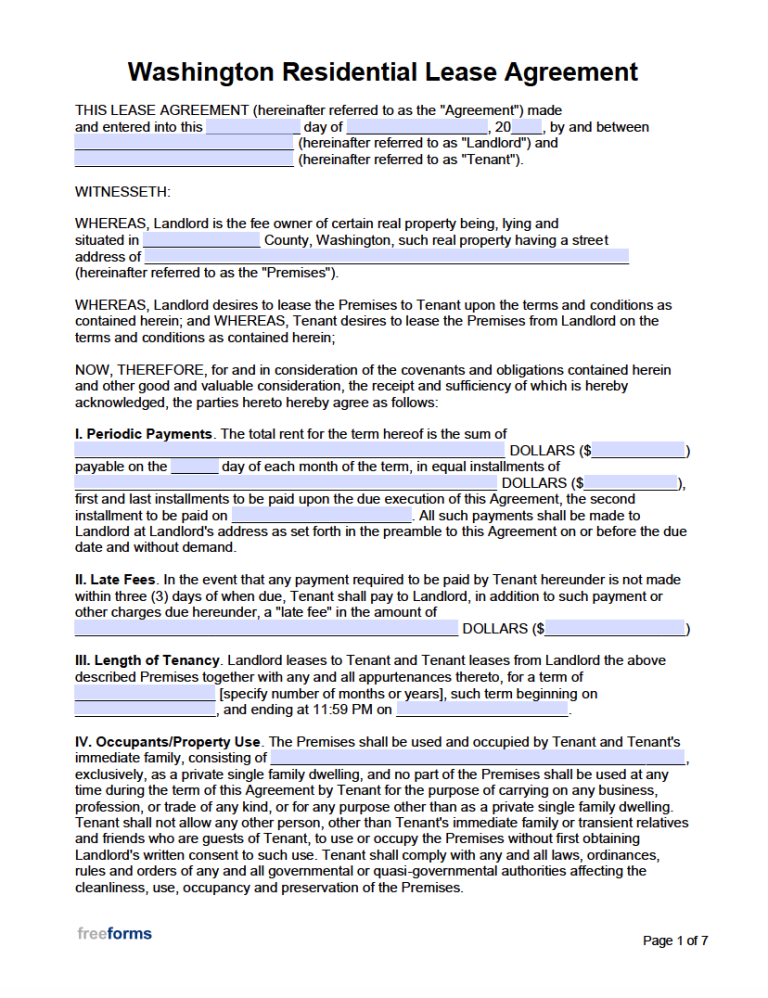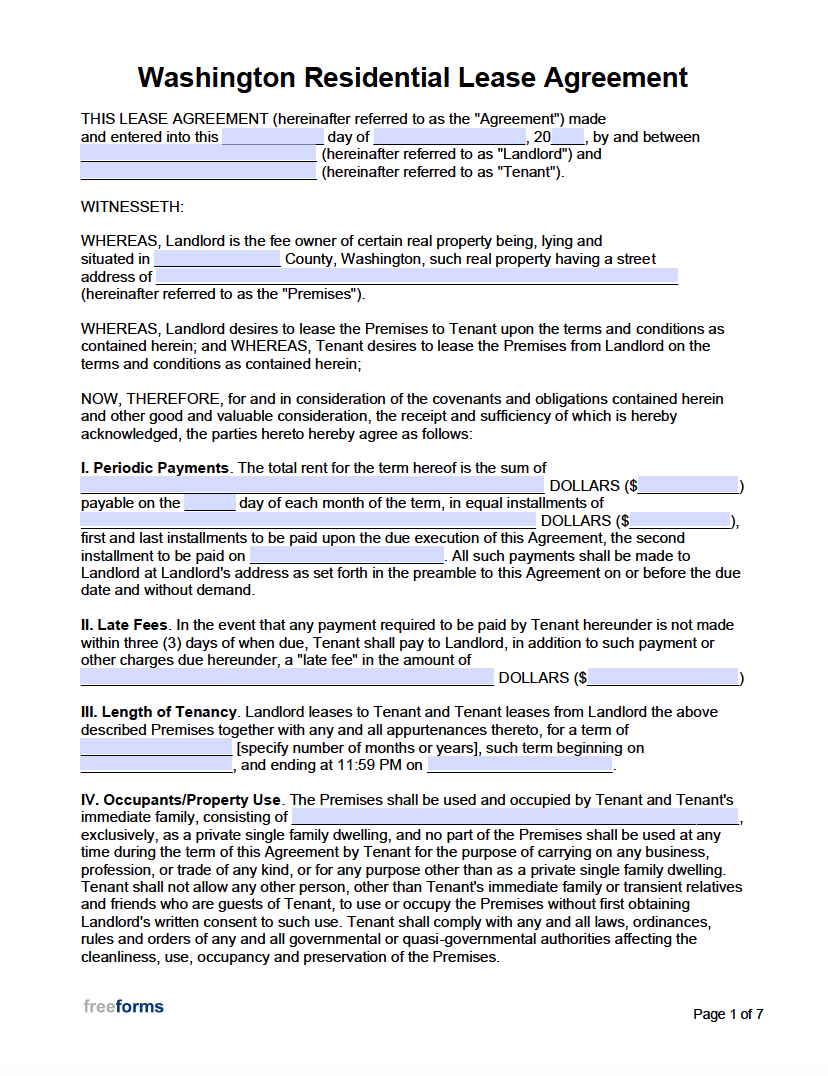Lease Agreements By Type
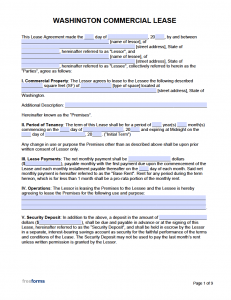 Commercial Lease Agreement – A contract illustrating the provisions involved in the renting of real property to be employed for business engagement.
Commercial Lease Agreement – A contract illustrating the provisions involved in the renting of real property to be employed for business engagement.
Download: PDF, Word (.docx)
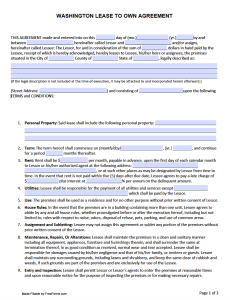 Lease to Own Agreement – A written commitment to rent a domicile for a given time, with an additional clause allowing for the option to buy at the end of the lease agreement.
Lease to Own Agreement – A written commitment to rent a domicile for a given time, with an additional clause allowing for the option to buy at the end of the lease agreement.
Download: PDF
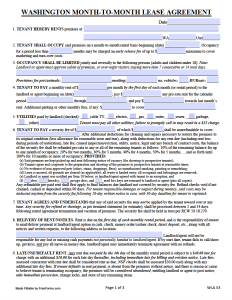 Month-to-Month Lease – A guaranteed obligation between a lessor and lessee to lease a property. The established term of the lease can extend to multiple years but provides for either individual to opt-out by giving thirty (30) days notice.
Month-to-Month Lease – A guaranteed obligation between a lessor and lessee to lease a property. The established term of the lease can extend to multiple years but provides for either individual to opt-out by giving thirty (30) days notice.
Download: PDF
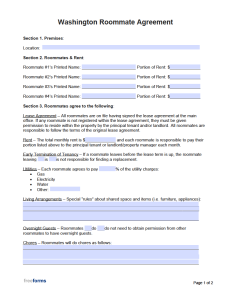 Roommate Agreement – A record highlighting the conditions involved in the renting of a fixed private space, and shared rooms within a home in exchange for a set monetary contribution during a predetermined period.
Roommate Agreement – A record highlighting the conditions involved in the renting of a fixed private space, and shared rooms within a home in exchange for a set monetary contribution during a predetermined period.
Download: PDF, Word (.docx)
Standard Lease Agreement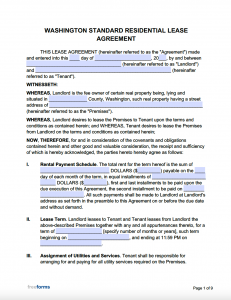 – The uniform paperwork assigned to index the corresponding terms and provisions of a residential leasing commitment.
– The uniform paperwork assigned to index the corresponding terms and provisions of a residential leasing commitment.
Download: PDF, Word (.docx)
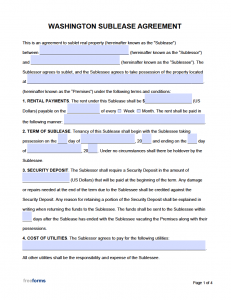 Sublease Agreement – Documents the bond to lease a portion or all of an estate from an individual that is currently renting the property.
Sublease Agreement – Documents the bond to lease a portion or all of an estate from an individual that is currently renting the property.
Download: PDF, Word (.docx)
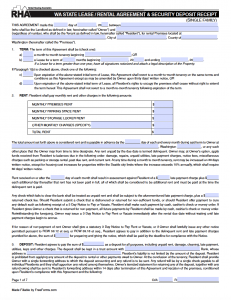 Washington RHA Version – The Rental Housing Association offers a lease/rental agreement for single-family dwellings along with a security deposit receipt.
Washington RHA Version – The Rental Housing Association offers a lease/rental agreement for single-family dwellings along with a security deposit receipt.
Download: PDF
Additional Forms
Satellite Dish Installation Addendum – Establishes the rules & regulations concerning the installation of a satellite dish on the premises.
Septic Tank Addendum – Provides an overview of the type of septic system contained on the property and the rules associated with that particular system. A monthly fee may be listed within the form and requires both the new resident’s and owner/agent’s signatures.
Smoke & Carbon Monoxide Detector – Allows the owner/agent to indicate the type of detectors that are presently operating on the property and what the tenant’s responsibilities are regarding the devices.
Smoke-Free Addendum – This addendum allows owners/agents to specify the building’s smoking policy. The new tenants may then acknowledge this information by signing off on the document confirming that they understand the terms of the policy.
Landlord-Tenant Laws
The specific content containing the guidelines and laws pertaining to the lessee and lessor involvement are available to be reviewed within the Revised Code of Washington § 59.18 Residential Landlord-Tenant Act.
Required Landlord Disclosures
Contact Information – The state of Washington mandates that the leasing paperwork must list the landlord’s name and address as well as any authorized managing officials for the building. If not stated in the lease, the owner’s name and address may be presented in plain view to be visible on the premises. (§ 59.18.060)
Non-Refundable Fees – Any payment amount required by the lease agreement must specify if it is non-refundable. The security deposit is a refundable amount that can only be withheld to damages to the property or unpaid rent (§ 59.18.285).
Security Deposit Receipt – It is obligated that any received payment to be held as security deposit be admitted a receipt as evidence of the compensation for deposit. The name and address of the financial branch to secure the funds must also be supplied in writing to the tenant (§ 59.18.270).
Move-in Checklist – when signing the lease, the landlord will provide the tenant with a copy of a checklist for the property, documenting any defects to the structure. Upon agreement, the tenant can affirm the evaluation and endorse the log. Once the termination of the lease has commenced, the checklist will be compared to any damage during the leasing period to determine what deductions, if any, are to be subtracted from the security deposit (§ 19.18.260).
Mold – Literature regarding the dangers of indoor mold must be present in the lease documents or posted on the property for the tenant to review. The information about unsafe molds must contain the education materials provided by the Department of Health(§ 59.18.060).
Lead-Based Paint (42 U.S. Code § 4852d) – Homes that were constructed before 1978 require an additional federal disclosure should there be any chance for lead-composed paint on the property. The disclosed information will inform of the precautions to take with the substance and any health complications that could arise from exposure.
Fire Protection and Evacuation – Any properties deemed other than single-family occupancy will require additional written materials on fire safety and building evacuation specifications. The details should refer to information about fire alarm systems, sprinkler systems, smoking policy, as well as the evacuation and relocation plans for the building (§ 59.18.060).
When is Rent Late?
The lease agreement will provide the exact date of each month in which installments should be made. State regulations do not lay down a declared time period where clemency is granted for late payments, although the contract for the rental agreement may specify a time amount.
Late Fees
The lease contract will list details involving the day payments are to be received by, and it may implement a grace period for late remittance. Should the monthly rental payment be later than the allowed grace period, the lessor can demand a late payment that can be between $20 and 20% of the monthly rent amount dependent on the lease. For a late fee to be enforceable, it must be stipulated within the language of the lease agreement (§ 19.150.150)
NSF Checks
For any rental installment made with a check that does not have adequate funding to process, there is a possible fee for each incidence. This fee is required to be referred to in the leasing contract to be imposed by the landlord (§ 62A.3-515).
Security Deposit Maximum
There is no regulation upon the amount that an owner or agent can demand as a security deposit for a property. In the case that interest is earned on the deposit amount while being held in a financial institution, the sum of the earnings shall remain with the lessor unless alternatively stated within the lease agreement (§ 59.18.270)
Security Deposit Return
The amount posted as security deposit by the lessee must be refunded by the lessor no more than 21 days after either the termination date of the lease agreement or the date the tenant moves out of the domicile. The landlord must provide a written account of all deductions for damage, unpaid rent, and/or late fees should it apply (§ 59.18.280).
Landlord’s Entry
The landlord of the property is obligated to inform the tenant in writing, with a minimum of forty-eight (48) hours advance notification, in order to enter into the premises. Emergency situations that necessitate accelerated action will not require two days notice for entry. (§ 59.18.150).
